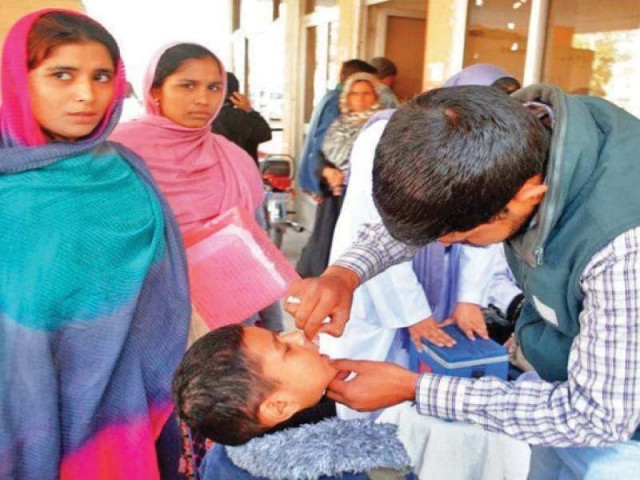First case of 2018 highlights need for multiple vaccinations in high-risk areas
As long as the virus remains present in nearby areas, no child is protected

PHOTO: FILE
The National Institute of Health (NIH) on March 29 had confirmed the first polio case of 2018. The detrimental virus was confirmed to be found in a 38 month-old child, from a Baloch speaking family, the child eventually became paralysed, the date of onset of paralysis being March 8 2018.
Despite being vaccinated during door-to-door immunisation campaigns, the child did not develop sufficient immunity to fight back the virus. According to officials, the child was not vaccinated in routine EPI but had received more than seven OPV doses in campaigns.
Special eight-day polio campaign to start in three high-risk districts of K-P
This is first case reported from Pakistan in 2018. Afghanistan has reported seven cases so far. Case count in 2017 was eight from Pakistan and 14 from Afghanistan.
Despite this being the first case of polio reported in Pakistan since November 2017, experts state that it was far from unexpected. “While this new polio case is disappointing, it does not come as a surprise. Our surveillance system has been indicating ongoing poliovirus transmission in the nearby districts of Loralai and Zhob. This polio case only confirms that the virus remains present in this area and as long as the virus is being detected anywhere in the country, no child is safe from being infected,” said Emergency Operation Centre for Polio Eradication in Pakistan, National Coordinator Dr Rana Muhammad Safdar. “Any child with low immunity will be where the virus will find refuge. We need to ensure all our children have received all their routine immunizations and are vaccinated, with two drops, every time the vaccine is offered,” he added.
However, children in specific areas require multiple does to attain substantially protective immunity. This is due to repeated episodes of diarrhoea, multiple infections as well as genetic predispositions which collectively aggravate the situation. For example, in India, the average number of doses given for polio prevention was 11.
Public health: ‘Vaccination campaigns can end polio’
Furthermore, it is encouraging that the programme was able to reach and vaccinate this child. It should further confirm our determination toward the eradication of the virus altogether. Our job is to keep our teams motivated to keep the momentum, he said.
The response to the new case is in process with the objective of protecting other children in the community, and putting the circulation of the virus to an immediate end. Pakistan Polio Eradication Programme has come a long way toward building a future in which polio no longer endangers children, families, and communities across our country. The number of cases recorded in Pakistan is the lowest it has ever been, with only eight cases recorded in 2017 against 20 in 2016, 54 in 2015 and 306 in 2014.
This year, the national polio eradication programme continues to address any remaining gaps to help a larger population achieve immunity in areas that are high risk and more vulnerable to polio including Karachi, Quetta and Peshawar, as well as keeping children safe from polio throughout the country. To this end, the programme is implementing strategies to find and immunize all children from each province, district, and union council. Children who move within provinces and between provinces are also being reached.
Multiple doses of the polio vaccine are required for a child to be fully protected – sometimes more than ten. Each additional dose further strengthens a child's immunity level against polio. Until a child is fully immunized, they are still at risk from polio. This emphasizes the need for all children to be immunized during every round of immunization campaign days. Every missed child is a place for the polio virus to hide and an increased area of vulnerability.
“Parents who do not ensure vaccination of their children are risking health and lives of their own children as well as others around them. It is thus the responsibility of communities to help identify and vaccinate such children,” said Dr Safdar. “We are closest ever to the goal of polio eradication. But to achieve it, we must all come together as a nation to ensure that every child in vaccinated. This is the only way we can collectively ensure that we erase polio from our land.”
Published in The Express Tribune, April 1st, 2018.


















COMMENTS
Comments are moderated and generally will be posted if they are on-topic and not abusive.
For more information, please see our Comments FAQ